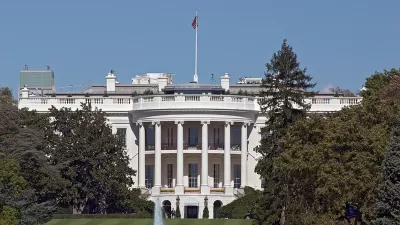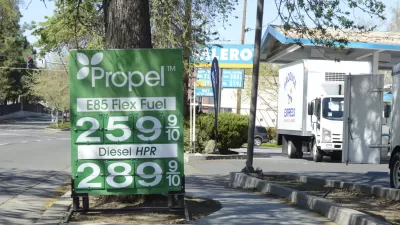The official case for repealing car fuel-economy rules is so full of errors it will be hard to defend in court.

Robinson Meyer shares details of the curious case of the Trump administration's attempt to appeal car fuel-economy standards put in place during the Obama administration.
The Trump administration’s official case for repealing car fuel-economy rules is riddled with calculation mistakes, indefensible assumptions, and broken computer models, according to economists, environmental groups, and a major automaker. The errors may seriously endanger the rule, hampering the White House’s ability to prove the proposal’s benefits exceed its costs and raising questions about whether it can survive an almost inevitable court challenge.
The mistakes range in scope from the comical to the bizarre, from the obviously accidental to the how-did-they-miss-that. In one case, federal employees have forgotten to divide a crucial figure by four. In another, officials have assumed that raising the cost of cars will lead more people to buy them, a violation of the principle of supply and demand. In a third case, the proposal asserts that freezing fuel-economy standards for new cars will lead the owners of old cars to drive their vehicles less.
What's more, every single error seems to tilt the analysis in the Trump administration's favor, according to Meyer's sources. Mistakes like that will make it very difficult to support the Trump administration's proposal when it inevitably faces a lawsuit.
In some cases, the mistakes are so large—and so central to the rule’s legal justification—that remedying them may destabilize the entire argument for the proposal. Public documents also make it clear that the Trump administration knew about some of the errors before the rollback was published.
Meanwhile, General Motors and Honda have broken ranks from the previous universal support for the Trump administration's moves to undo the Obama-era fuel economy rules. Ryan Beene and John Lippert report in a separate article:
General Motors Co. plans to propose that instead of opposing California’s so-called zero emission vehicle sales mandate, federal regulators should instead embrace a nationwide electric-car sales program starting in 2021. Honda Motor Co., meanwhile, took exception to Trump’s proposed freeze on mileage standards and called for steadily increasing requirements to continue.
FULL STORY: The Trump Administration Flunked Its Math Homework

Alabama: Trump Terminates Settlements for Black Communities Harmed By Raw Sewage
Trump deemed the landmark civil rights agreement “illegal DEI and environmental justice policy.”

Planetizen Federal Action Tracker
A weekly monitor of how Trump’s orders and actions are impacting planners and planning in America.

The 120 Year Old Tiny Home Villages That Sheltered San Francisco’s Earthquake Refugees
More than a century ago, San Francisco mobilized to house thousands of residents displaced by the 1906 earthquake. Could their strategy offer a model for the present?

In Both Crashes and Crime, Public Transportation is Far Safer than Driving
Contrary to popular assumptions, public transportation has far lower crash and crime rates than automobile travel. For safer communities, improve and encourage transit travel.

Report: Zoning Reforms Should Complement Nashville’s Ambitious Transit Plan
Without reform, restrictive zoning codes will limit the impact of the city’s planned transit expansion and could exclude some of the residents who depend on transit the most.

Judge Orders Release of Frozen IRA, IIJA Funding
The decision is a victory for environmental groups who charged that freezing funds for critical infrastructure and disaster response programs caused “real and irreparable harm” to communities.
Urban Design for Planners 1: Software Tools
This six-course series explores essential urban design concepts using open source software and equips planners with the tools they need to participate fully in the urban design process.
Planning for Universal Design
Learn the tools for implementing Universal Design in planning regulations.
Clanton & Associates, Inc.
Jessamine County Fiscal Court
Institute for Housing and Urban Development Studies (IHS)
City of Grandview
Harvard GSD Executive Education
Toledo-Lucas County Plan Commissions
Salt Lake City
NYU Wagner Graduate School of Public Service





























